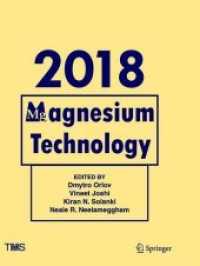- ホーム
- > 洋書
- > 英文書
- > Computer / General
Full Description
The 3-volume set LNAI 16131 -16133 constitutes the refereed proceedings of the 17th International Conference, ICSR+AI 2025, held in Naples, Italy, during September 10-12, 2025.
The 117 full papers and 57 short papers included in the proceedings were carefully reviewed and selected from 276 submissions. They focus on the topical sections:
Part 1 Emotion & Affective Interaction; Applications in Real-World Case Studies; LLMs & Conversational / Verbal Interaction; Motion Control, Prosthetics & Functional Robotics; Context Awareness & Explainability; Ethics, Trust & Social Acceptability.
Part 2 Emotion & Affective Interaction; Applications in Real-World Case Studies; LLMs & Conversational / Verbal Interaction; Motion Control, Prosthetics & Functional Robotics; - Context Awareness & Explainability; Ethics, Trust & Social Acceptability; Decision-Making / Behavior Modeling.
Part 3 Emotion & Social Interaction in HRI; Trust, Autonomy, and Cognitive Models ; Assistive & Educational Applications in HRI.
Contents
.- Regular Session 2.1 - Emotion & Affective Interaction.
.- Visualizing the past: emotional and cognitive impacts of AI-Generated Images in Human-Robot Interaction.
.- When Robots Care: Elderly Reactions to Emotionally Intelligent Actroid-F.
.- A Multimodal Emotion Recognition Approach for Socially Assistive Robots.
.- Empathy in child-robot interaction.
.- Driven by Personality?.
.- Regular Session 2.2 - Applications in Real-World Case Studies.
.- EBO Robot in Elderly Care: Interaction Styles and Multimodal Engagement Through Serious Games in Care Centers.
.- Designing User Experiences with Social Robots: A Field Study on Acceptance in Public Libraries.
.- Participatory Design for Human-Robot Interaction with Syrian Refugees and Asylum Seekers.
.- Using the Pepper Robot to Support Sign Language Communication.
.- Evaluating the Role of Robot Form and Intelligence in the Ultimatum Game.
.- Regular Session 2.3 - LLMs & Conversational / Verbal Interaction.
.- Connecting through shared memories. Episodic Memory for Social Robots Using Offline LLMs.
.- Intuitive Control of a Social Robot Using Natural Language with Large Language Model and Error Correction Capabilities.
.- Storytelling and self-other integration with robots: creation and validation of storytelling stimuli that induce social identification with the QT robot.
.- Personalized Socially Assistive Robots With End-to-End Speech-Language Models For Well-Being Support.
.- Towards improving turn-taking in social robots using Visual-Only Voice Activity Detection in multimodal dialogue systems.
.- Regular Session 2.4 - Motion Control, Prosthetics & Functional Robotics.
.- Optimizing Prosthetic Wrist Movement: A Model Predictive Control Approach.
.- Evaluating social impact of pedipulation with quadrupedal robot.
.- Slosh-Aware Trajectory Control in a Reconfigurable Staircase Service Robot.
.- HaptiCam: Skin-drag Haptic Feedback for Real-time Communication of Camera Settings.
.- A Mixed Reality User-friendly Interface for Robot Teleoperation.
.- Regular Session 2.5 - Context Awareness & Explainability.
.- Classification of User Satisfaction in HRI with Social Signals in the Wild.
.- Bayesian goal inference engine for intent prediction in Human-Robot Collaboration.
.- Pluri-perspectivism in Human-robot Co-creativity with Older Adults.
.- Exploring Avoidance Strategies between Humans and Robots in Social Navigation.
.- Improving Human-swarm Interaction Through Speech Control and Peer-to-peer Micro-agent Communication.
.- Regular Session 2.6 - Ethics, Trust & Social Acceptability.
.- Ethical and Societal Challenges Facing Social and Educational Robots - Insights from the KASPAR experience.
.- Bayesian Proximal Policy Optimization with Adaptive Learning and Episodic Memory for Social Robot Navigation.
.- Automatic Assessment of Speaking Proficiency for Language Practice Robots.
.- Towards improving turn-taking in social robots using Visual-Only Voice Activity Detection in multimodal dialogue systems.
.- Improving Engagement in Robot Lecture through Personality Expressed by Teacher Robot.
.- Regular Session 2.7 - Decision-Making / Behavior Modeling.
.- A Bayesian Neural Networks Approach for Spatial Relations Learning in Human-Robot Collaboration.
.- Vision based Hybrid IK Task Planning with Feedforward Neural Network for Collaborative Plant-Robot Interaction in Precision Farming.








